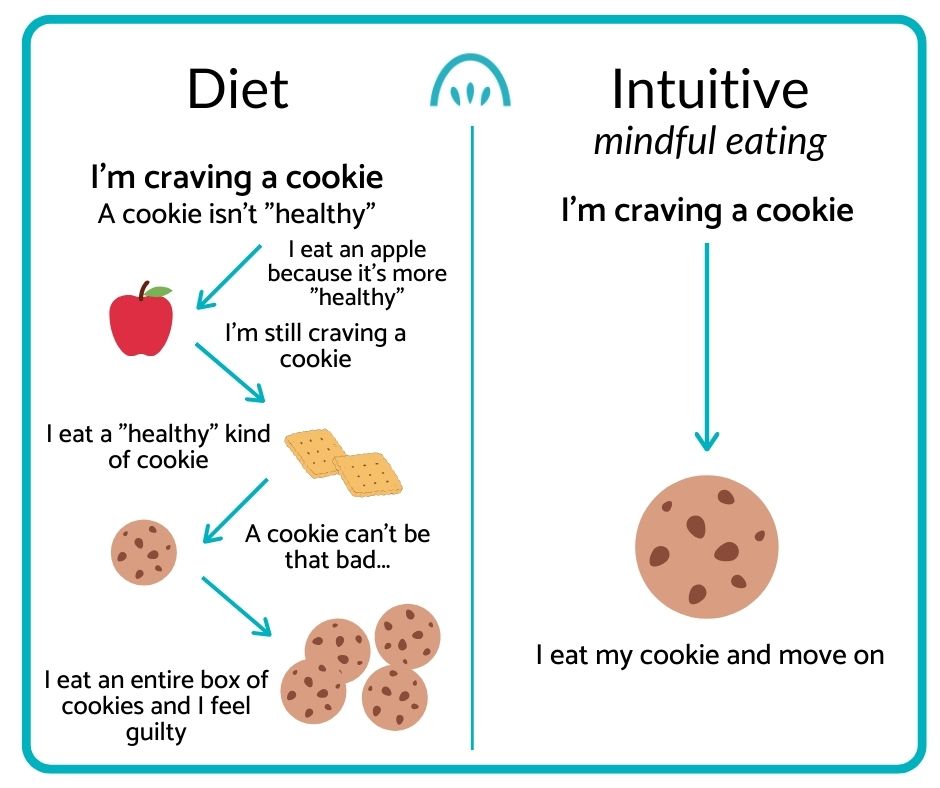
Our bodies have a sophisticated way of signaling their nutritional needs, often in the form of cravings. Listening to these bodily cues can help you adjust your diet to meet your nutritional needs in a balanced way in the long term.
Triggers for Cravings
Nutritional Needs
While the message may not always be clear, it could be a need for specific calories or macronutrients, such as carbohydrates. For example, if you avoid starchy foods during main meals, you may experience cravings in the late afternoon or evening.
Emotions and Cravings: A Complex Link
Our emotions often play a significant role in our cravings and the pleasure of eating, whether they are positive or negative. For instance, emotions like sadness, stress, or anger can drive us to seek comfort foods. Conversely, moments of celebration or pure pleasure can encourage us to extend the taste experience, even beyond our physical hunger. Recognizing the impact of emotions on our food choices can help us become more aware and respond in a positive and compassionate manner.

Habits and Socialization
Our daily habits and social environment have a considerable impact on our cravings. Whether it's the habit of snacking in front of the TV or the subtle influence of social media, these factors can trigger sudden food cravings. External stimuli, such as advertisements or the smell of appetizing foods, can also prompt spontaneous food choices. Being aware of these influences can help us better understand and manage our cravings.
How to Deal with These Cravings?
Listen to Your Body
To better understand the reasons behind your cravings, it's helpful to consider that our bodies can sometimes confuse hunger with other signals, like thirst or boredom. One technique to try is the water test: drink a large glass of water and wait for about 20 minutes. This break not only allows you to better grasp your body's signals but also distracts you or gives you time to reflect on what might genuinely trigger that desire to eat. If you still feel hungry after this period, you likely need to eat, whether it's a snack or even a full meal. If the craving subsides, it could indicate that your initial desire to eat was influenced by factors like thirst or boredom. This method can help you distinguish between true hunger and a craving and respond more appropriately to your body's needs.
Make Informed Choices
If the craving is strong, and you decide to indulge, do so mindfully. A "food detour" often happens when we choose a less satisfying substitute for the food we truly desire. For example, opting for a social tea biscuit when you really want a chocolate chip cookie. The risk with these detours is that they can leave us unsatisfied, which can lead to overconsumption later. So, avoid food detours and savor what you eat without guilt. Making peace with food and eating mindfully can help you honor your health and taste buds.

Eat Regularly
Not skipping meals when hungry is crucial to maintaining a healthy dietary balance and preventing cravings. This is especially important when you have a busy schedule or have missed your usual mealtime. Ignoring this advice can lead to impulsive choices of high-energy foods, especially later in the day when fatigue and the need to relax set in. Ideally, do not let more than 3-4 hours pass between each meal or snack to maintain stable blood sugar levels and avoid sudden cravings for fat or sugar.
Need a Helping Hand? Seek Expert Assistance
Managing cravings can be a real challenge. Fortunately, a positive and caring nutritionist-dietitian can offer you personalized support. The expertise of these professionals will not only help you identify the specific triggers of your cravings but also find dietary strategies that suit your lifestyle. This tailored approach will allow you to make more informed choices and better understand what your body is trying to tell you through these cravings.
Decoding the Messages of Your Appetite
Food cravings are not your enemies. They are rather a form of language that your body uses to communicate with you. The challenge is to know how to listen to them and respond in a balanced and conscious manner following the principles of intuitive eating.
If you want to explore further how to understand and manage these bodily signals, do not hesitate to make an appointment with one of our Registered Dietitian at TeamNutrition. They can help you navigate this subtle communication between your body and mind, using positive approaches that respect your individual needs and dietary intuition.





